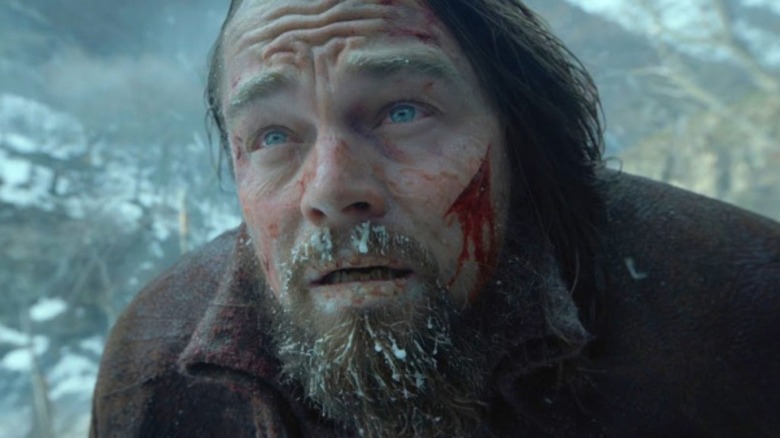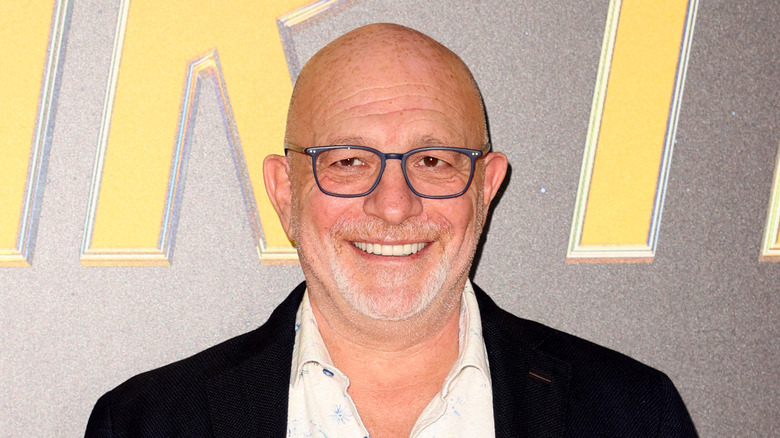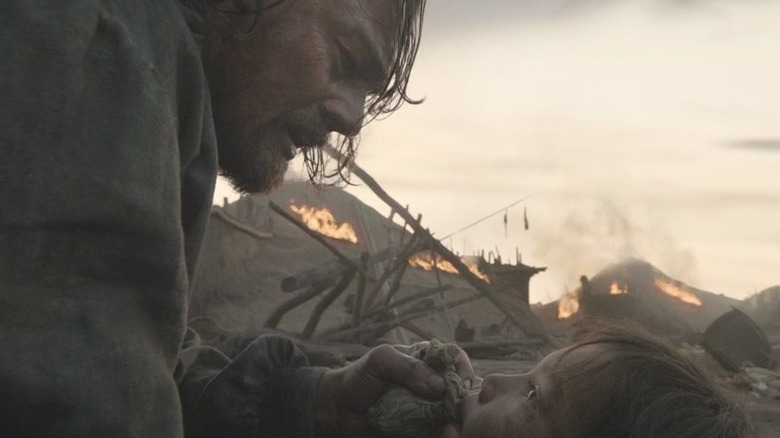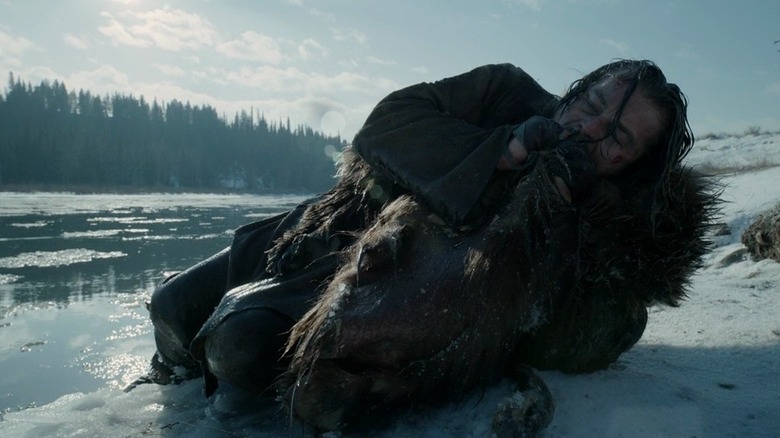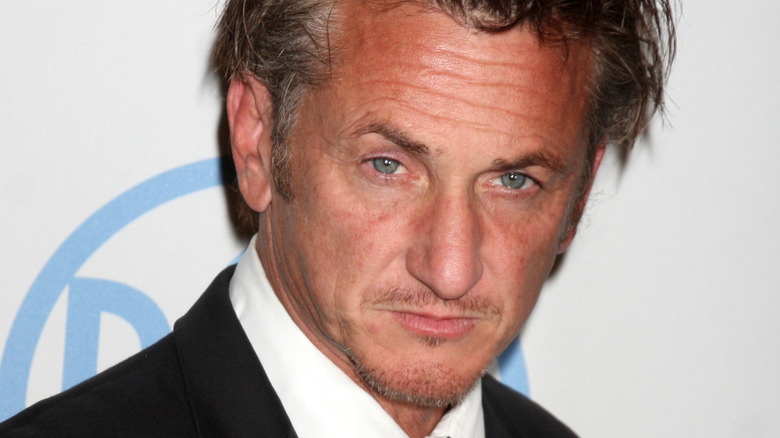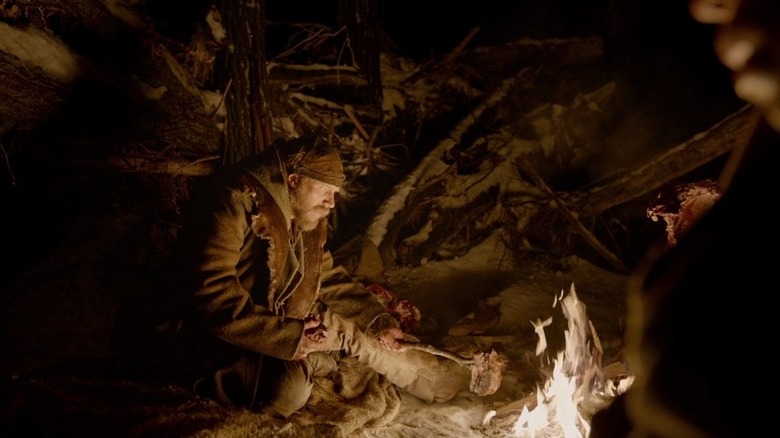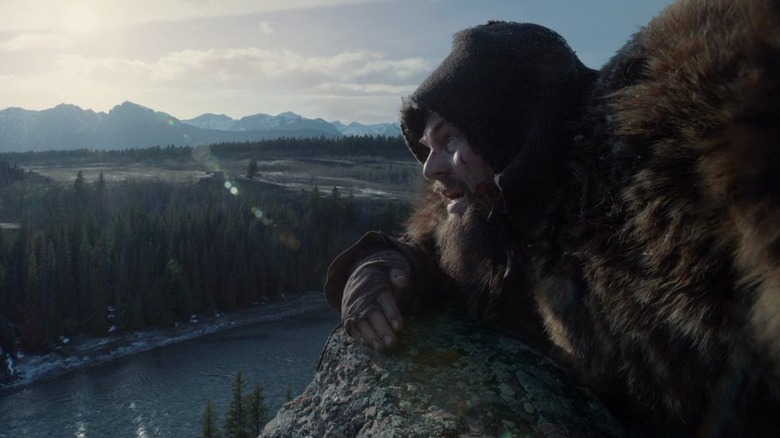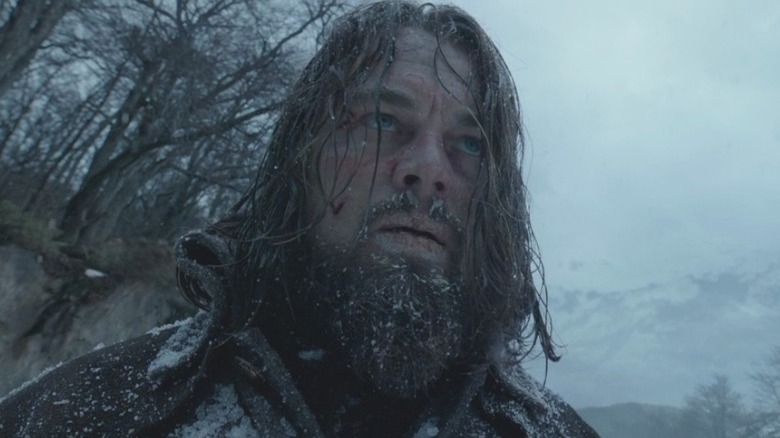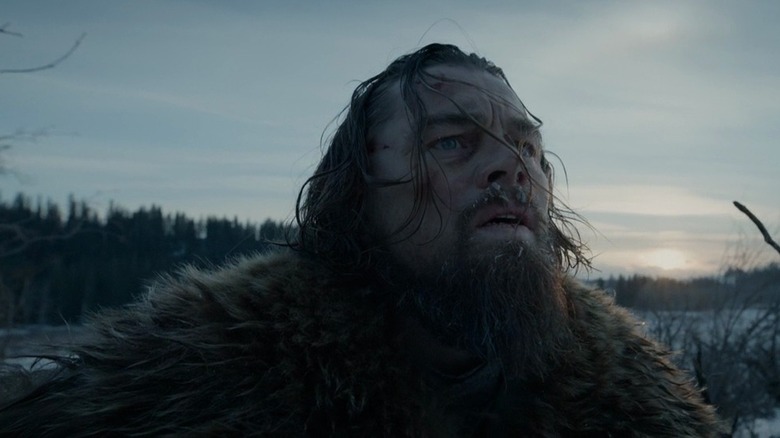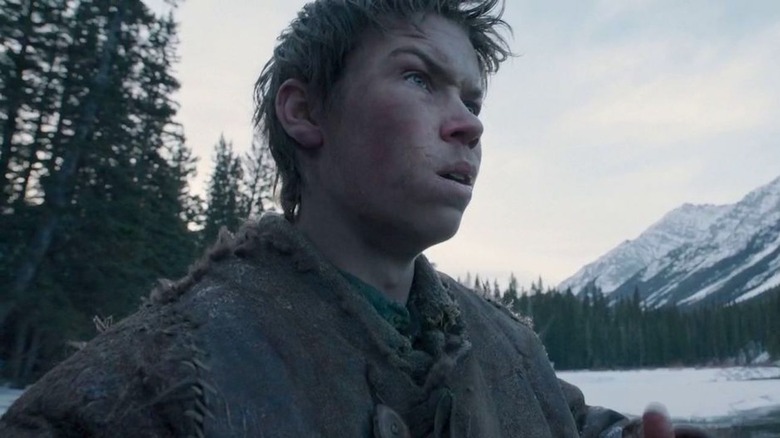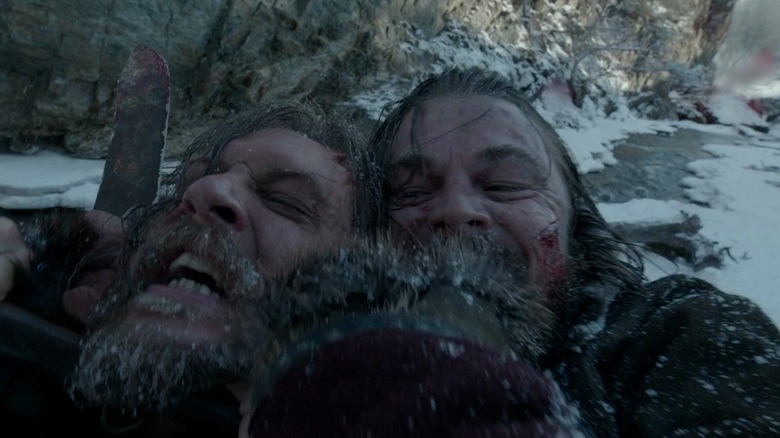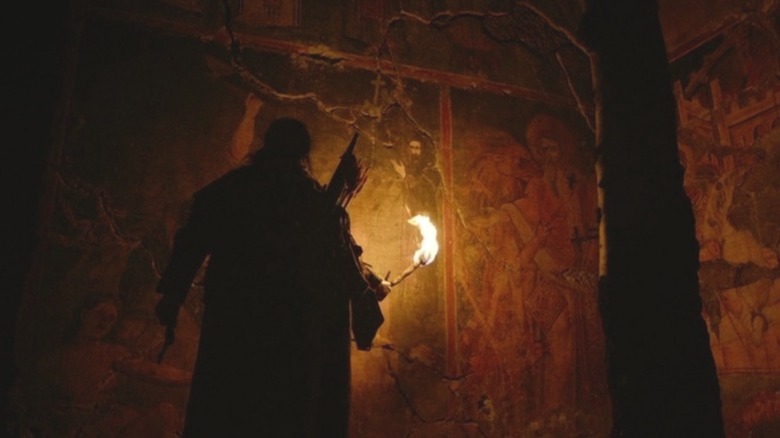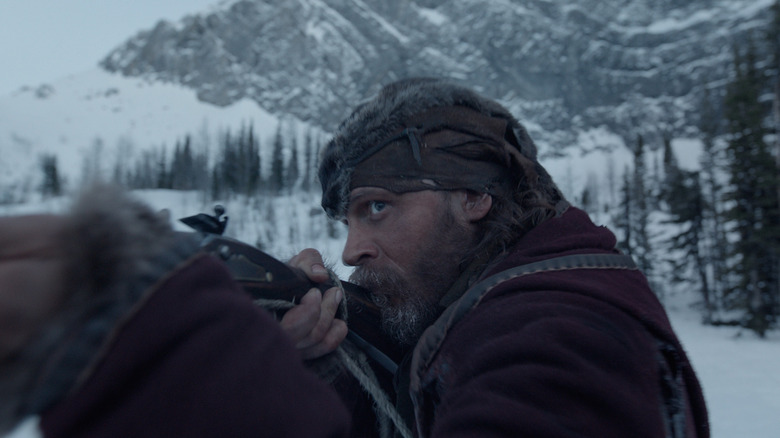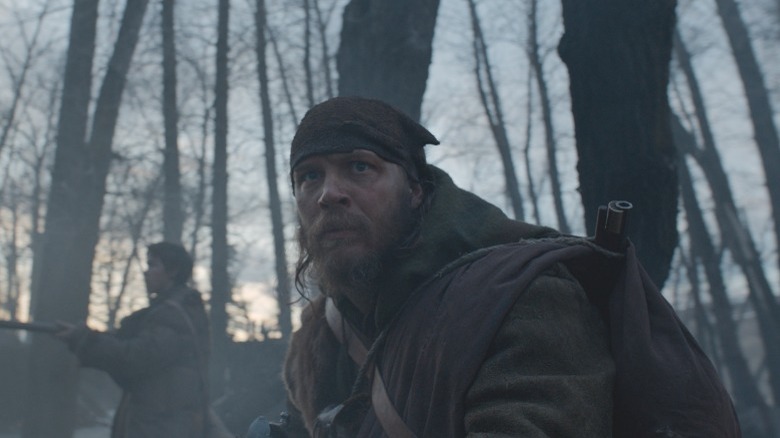The Untold Truth Of The Revenant
"The Revenant" is a movie about a man fighting against the relentless cruelty of nature. It's also a revenge story, a saga about what we sacrifice when we orient our lives around punishing others. In addition, "The Revenant" also lets director Alejandro Gonzales Inarritu continue to experiment with unorthodox camerawork, as he did in prior projects like "Birdman." On top of everything else, it's also the feature that earned Leonardo DiCaprio his first Academy Award, a momentous event that capped off years of speculation over when or if he would take home that trophy. "The Revenant" is more than just another gritty Western and, thanks to its sizeable box office haul, it's clear that audiences around the world are well aware of its intricacies.
But bringing a project as complicated as "The Revenant" to life takes a lot of effort that spans years and years. All of the energies devoted to bringing this movie to life, not to mention the larger cultural forces it encountered in its initial theatrical run, inform the movie's untold story, which spans everything from actors who could have been in the film to challenges in principal photography and so much more. It's time to uncover even more layers to the rich narrative of "The Revenant" by unpacking everything that this motion picture's untold truth has to offer.
The earliest origins of The Revenant
The concept of adapting Michael Punke's book "The Revenant" for the screen dates back to 2001. This is when the news first broke that Hollywood was angling to turn Punke's tome into a movie. At the time, "The Revenant" had not even been published yet, which made Hollywood's passion for this material all the more intriguing. Interestingly, the man responsible for first picking up the film rights to "The Revenant" was none other than Akiva Goldsman. Though an Oscar-winning screenwriter who had penned "A Beautiful Mind," Goldsman is best known for his genre movie exploits.
These have included writing the scripts for "Batman and Robin" and "Transformers: The Last Knight," as well as later co-creating TV programs like "Star Trek: Strange New Worlds." In other words, he doesn't quite sound like the kind of guy that would be involved in a movie helmed by Alejandro Gonzales Inarritu. Perhaps this is why Goldsman ended up receiving no credit of any kind on the final version of "The Revenant," though his involvement with the project seemed to stop long before Inarritu became its director. Even if he wasn't connected to the final version of "The Revenant," Goldsman was still instrumental in seeing the cinematic potential of the film's source material even before it had hit store shelves.
Park Chan-wook's version of The Revenant
Like many movies that end up being big hits, "The Revenant" took a long time to make it to the big screen. Screenwriter Mark L. Smith recalled to No Film School how he had trouble even getting studio executives to commission a screenplay for this adaptation, because they were worried that a film with a largely dialogue-free protagonist would have no commercial appeal. So Smith set off to write the script on his own, attracting many different filmmakers in the process. One of the very first iterations of the film would have allegedly seen "Oldboy" and "The Handmaiden" director Park Chan-wook helming the feature, with Samuel L. Jackson playing the lead role of Hugh Glass.
Park clarified to IndieWire that this version of "The Revenant" was barely ever on his radar, since he was already looking to helm another Western when he was first offered the film. With his attention already focused on this competing project, the iconic filmmaker had little time to consider "The Revenant" as a major directorial effort, let alone map out more concrete details about what his vision for "The Revenant" would look like. Even if it was only fleeting, the connection between "The Revenant" and Park Chan-wook established how this film kept attracting big-name auteurs throughout its lengthy development phase.
John Hillcoat and Christian Bale's vision of The Revenant
One might imagine that Alejandro Gonzales Inarritu was waiting in the wings to create the version of "The Revenant" that audiences eventually saw in theaters. But the road to the big screen was long and winding for "The Revenant" and other filmmakers took a swing at this material before Inarritu got hold of it. In May 2010, screenwriter Mark L. Smith revealed exclusively to Bloody Disgusting that "The Road" director John Hillcoat was tackling "The Revenant" and that Christian Bale would take on the lead role of Hugh Glass.
It's easy to see why Hillcoat would be attracted to this material, given how its brutal nature lines up with the generally grim atmosphere of his works, such as "The Road" or "Lawless." However, a few months later, Hillcoat departed the project (via The Playlist) for unknown reasons. In 2016, Hillcoat revealed to Collider that he wanted to make "The Revenant" on a very small budget, but decided to step away when the studio wanted to expand the scope of the project. With Hillcoat down for the count, "The Revenant" continued on its lengthy development process, which would finally come to a close once Inarritu signed on to helm the feature.
Sean Penn was initially eyed for The Revenant
Leonardo DiCaprio was eventually set to play Hugh Glass, the protagonist of "The Revenant," and was attached to the project for years before filming began. However, someone else was initially set to portray John Fitzgerald, the character played by Tom Hardy who decides to leave Glass to die in the wilderness. When DiCaprio's involvement in "The Revenant" was first announced, Deadline revealed that Sean Penn was also in talks to be the co-lead of the film. The initial report did not mention if Penn was interested in the project.
Alejandro Gonzales Inarritu's desire to work with Penn stemmed from the duo's collaboration on the 2003 film "21 Grams." Though Penn had played the lead role in that earlier Inarritu feature, he did not end up being a part of "The Revenant." In the end, Penn pursued other projects and Tom Hardy took on the part of Fitzgerald. However, Penn did have a connection to "The Revenant" years later: he ended up announcing Inarritu as the winner of the Academy Award for Best Director for his work on "The Revenant." It wasn't the same as being the movie's co-lead, but Penn still played some kind of role in the history of "The Revenant."
The budgetary struggles of The Revenant
A film as bleak and brutal as "The Revenant" was always going to be a tough sell in Hollywood. No wonder, then, that "The Revenant" was set up at independent production companies like Regency Enterprises and Anonymous Content rather than originating from one of the big American movie studios (20th Century Fox did agree to distribute the title as part of its long-term contract with Regency). While going this route ensured that "The Revenant" could follow its creative vision, it also meant that financing would be risky, as it would have to come from several independent parties.
The hazards of this approach were apparent just before filming began, when The Hollywood Reporter noted that "The Revenant" was close to shutting down after Worldview Entertainment backed out of financing the feature. At the time, news broke that Megan Ellison's Annapurna Pictures was in talks to come aboard and help finance the film. However, there is no final credit for Annapurna or Ellison on the finished film, so it is unlikely they were involved in the final product. It instead appears that Guangdong Alpha Animation and Culture Company, a Chinese outfit, came on to supply the necessary funds. It was an arduous task to get "The Revenant" rolling even before shooting commenced, though its eventual success at the box office meant that all the blood, sweat, and tears were worth it.
The Revenant was filmed in chronological order
Typically, movies don't shoot their scenes in chronological order. It's a facet of filmmaking that's often done to accommodate the complicated schedules of actors as well as when certain spaces or sets will be available for shooting. However, certain films have managed to shoot their stories in sequential order, though rarely have they been at the scale of "The Revenant." In a report on the film's budgetary woes, The Hollywood Reporter first revealed that Inarritu wanted to shoot "The Revenant" in this manner, even though going this route would add a whopping $7 million to the film's escalating budget.
Initially, it appeared that the practicalities of executing a movie this big on real locations thwarted this plan, as Tom Hardy noted to Collider in April 2015 that these ambitions had been scuttled due to unpredictable weather conditions. However, Inarritu later confirmed that he did indeed get to film "The Revenant" in chronological order. He also clarified that he committed to such an unorthodox method of shooting because it was the best way for him to get inside the heads of his characters and understand their journey. Plus, when has the director of "Birdman" ever taken the easy way out when it comes to filmmaking?
The lengthy shoot of The Revenant
Every frame of "The Revenant" seems to emanate an air of hopeless pain. The relentlessly unpredictable elements of the wilderness are always bearing down on the film's human characters. Their squabbles, no matter how deeply personal, are dwarfed by the expansive vistas surrounding them. Not surprisingly, it turns out that filming "The Revenant" was also an arduous experience in real life. In a revealing interview with Deadline, Alejandro Gonzales Inarritu noted that the film's principal photography spanned nine months. Part of why this took so long was that preparing for any given shot in a single day took up so much time that already half of the shooting day was gone once everything was set up.
However, the lighting and locations that Inarritu captured were so outstandingly radiant to the filmmaker that he found the arduous scheduling worth it. He also found the intense atmosphere of the movie benefited from the unique scheduling of the shoot, while the unpredictable weather also played a part in why everything took so long. These unorthodox tactics did prove controversial, however. The Hollywood Reporter quoted unnamed crew members who complained about the working conditions and harrowing nature of the shoot, though many of them laid their complaints at the feet of producer Jim Skotchdopole rather than Inarritu.
Tom Hardy had to leave Suicide Squad because of The Revenant
When the cast for "Suicide Squad" was first announced (via The Hollywood Reporter), one of the leads was set to be Tom Hardy as Rick Flagg. However, this casting was complicated by the actor's commitments to "The Revenant." Though it initially looked like Hardy would be able to do both movies without a hitch, the elongated shooting schedule of "The Revenant" began to put a kink in this plan. As principal photography stretched on and on for "The Revenant," Hardy eventually had to drop out (via THR) of "Suicide Squad" so he could finish his "Revenant" commitments.
Sometimes, excuses like "scheduling conflicts" are used in the press to cover up much more dramatic reasons for why an actor has left a movie. However, in May 2015, Hardy clarified to Collider that this was the real reason for him leaving "Suicide Squad." Months after he had to depart the production, Hardy also revealed that he was still frustrated about having to leave a role he was excited for. Hardy may not have been happy about this, but sticking with "The Revenant" ended up being a wise move since he scored his first Oscar nomination for the movie. Plus, he didn't have to say some of Rick Flagg's most infamous "Suicide Squad" lines, like his dialogue used to introduce the character Katana.
Will Poulter's experience on The Revenant set
Will Poulter has been all over the place in his acting career. Getting his start as a child performer in projects like "Son of Rambow" and "The Chronicles of Narnia: The Voyage of the Dawn Treader," Poulter has gone on to appear in productions as varied as "Detroit," "Guardians of the Galaxy Vol. 3," and "The Revenant." In the latter film, he plays the role of Jim Bridget, a young man who reluctantly cooperates with John Fitzgerald's plan to leave Hugh Glass to die.
Filming a movie as harrowing as "The Revenant" is never a picnic, though surprisingly, Poulter didn't find it to be the most intense set he'd ever been on. Poulter revealed to Boston magazine that his time shooting "We're the Millers," where he played awkward punching bag Kenny, was emotionally trying. He used this particular movie as an example of how a seemingly frivolous comedy could end up being just as difficult to shoot as a brutal drama like "The Revenant." Despite the challenges stemming from weather and the dark material, Poulter did find "The Revenant" to be a highly rewarding experience as an actor, since it led to such a fulfilling collaborative experience between all the people on the set.
The unexpected pre-release leak of The Revenant
It's always frustrating and even downright crushing when a theatrical movie leaks online before it hits theaters. Everyone involved in the project worked so hard to bring it to life and deserved to have their work seen on a big screen first and foremost, rather than have it drop online out of the blue. This was the fate of "The Revenant," which ended up getting leaked online (via The Verge) just days before its limited theatrical debut in North America. At the time of the leak, it was thought that "The Revenant" was one of several 2015 awards contenders that may have been leaked onto the internet through the distribution of award season DVD screeners.
The saga of "The Revenant" getting leaked online would come to a close 10 months after it was first put on the web, when former 20th Century Fox employee William Kyle Morarity pleaded guilty to uploading the film (as well as fellow 20th Century Fox title "The Peanuts Movie") from a stolen screener. He was sentenced to a home detention stretch as well as a massive fine. As for "The Revenant," getting leaked online was certainly a disappointment for all those who had worked on the film. but the piracy didn't seem to hurt the movie's ability to draw moviegoers to see it in a theater.
The massive box office run of The Revenant
"The Revenant" was not an easy film to finish, but once it ended up in movie theaters, audiences responded to it. The film's wide release box office run got off to a great start in North America when it opened at $39.8 million. That was already within spitting distance of surpassing the $42 million domestic total of the last Alejandro Gonzales Inarritu film, "Birdman." From there, "The Revenant" managed to score a massive $183.6 million in North America alone. Impressively, that made this brutal R-rated movie the third-biggest Leonardo DiCaprio movie ever domestically, only behind "Titanic" and "Inception."
"The Revenant" proved to be just as much of a draw overseas, a notable feat given that Westerns often have trouble translating to international markets. In overseas territories, "The Revenant" made $349.3 million, for a total $533 million worldwide haul. Even on a massive (for an adult drama) $135 million price tag, "The Revenant" still managed to earn nearly four times its budget. It also ended up as the 13th biggest movie of 2015 worldwide, surpassing the likes of "Ant-Man" and "San Andreas." Needless to say, "The Revenant" was a glowing success in theaters and enough of a moneymaker to make it seem like all that on-set turmoil was worth it.
The Revenant was not supposed to be released in China
It's easy to see why "The Revenant" was not originally supposed to receive a release in China. Per The Los Angeles Times, the extreme violence and grisly nature of "The Revenant" made it impossible for this movie to get past China's strict censors. The same article, however, noted that "The Revenant" not getting a Chinese release didn't mean that residents of China weren't rooting for its leading man, Leonardo DiCaprio, to score big at the Oscars. Projects ranging from "Titanic" to "Growing Pains" led DiCaprio to become one of the biggest and most beloved American movie stars in China, to the point that he cultivated the nickname "Little Leo" in the territory.
This fandom made it apparent why DiCaprio would be cheered on by Chinese moviegoers when the Academy Awards rolled around, but it still didn't appear to be enough to get "The Revenant" into cinemas in that country. But then a miracle happened: The Hollywood Reporter revealed in February 2016 that, after "The Revenant" won three Oscars, it would get a theatrical release in China, though initial word was that it would need to be heavily censored to make it into the country. Once it was released, however, it was revealed that only 90 seconds were trimmed for the Chinese version of "The Revenant," which ended up doing spectacular box office in that nation.
The Oscar glories of The Revenant
The works of Alejandro Gonzales Inarritu have long been staples of various Academy Award ceremonies. His 2003 film "21 Grams" kicked this trend off by scoring a pair of acting Oscar nominations for Naomi Watts and Benicio del Toro, while his 2006 feature "Babel" became the first Inarritu title to land nominations in the Best Picture and Best Director categories. Of course, Inarritu's most prestigious showing at the Academy Awards came with "Birdman," which won the Best Director and Best Picture trophies. Just a year after that film's Oscar victories, "The Revenant" saw Inarritu returning to this ceremony with another award season juggernaut.
At the 88th Academy Awards, "The Revenant" was up for a whopping 12 Oscars, including Best Picture. It managed to take home several notable trophies, including a Best Actor win — his first — for Leonardo DiCaprio. Though it lost Best Picture to "Spotlight," "The Revenant" still managed to snag a win for Best Director. Not only did this mean that Inarritu had won the trophy for two consecutive years, but it also made him one of only 20 filmmakers in the history of the Academy Awards to win multiple Best Director statues. Throw in an additional win for Best Cinematography for Emmanuel Lubezki and this turned out to be an extraordinary night for "The Revenant."
